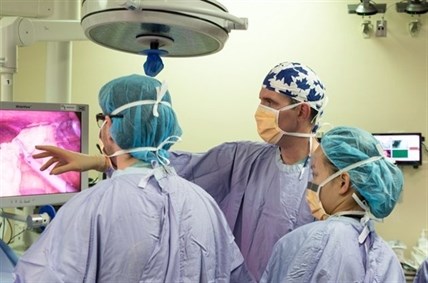
Dr. Teodor Grantcharov is shown in the operating room, with a split-screen monitor in the background showing black box data. Grantcharov, who works at Toronto's St. Michael's Hospital, is adapting "black box" aviation technology to track surgeries and improve patient outcomes.
Image Credit: THE CANADIAN PRESS/HO-St. Michael's Hospital-Geoff Koehler
August 30, 2014 - 2:41 PM
TORONTO - A Toronto surgeon who is working to adapt black box aviation technology to track surgeries and improve patient outcomes says preliminary results are promising.
In Dr. Teodor Grantcharov's operating room,"the whole room is wired." Cameras and microphones capture movement and conversation, and patient data, like heart rate and blood pressure, is logged automatically by a data recorder similar to black boxes used on airplanes to record flight data.
The surgery box, which is actually blue, is poised to change medical culture and practice, said Grantcharov, a minimally-invasive surgeon at St. Michael's Hospital and professor at the University of Toronto.
Once surgeons finish their medical training and begin practising independently, "nobody watches us, nobody coaches us, and nobody provides feedback," he said.
This lack of feedback, as well as the pressure for surgeons to appear as though they never make errors, is not serving the medical community, Grantcharov said.
"Changing the culture starts with admitting or being transparent about our deficiencies."
Inspired by the airline industry's willingness to acknowledge human error and reconstruct accidents in order to learn from them, he began developing the technology a couple of years ago, and has been in consultation with Air Canada for the past six months. A test program has been in effect at St. Michael's since April, and he said patients are excited and willing to participate.
Grantcharov said the data collected this spring and summer has yet to be analyzed, but preliminary results are showing that minor inconveniences in the operating room can end up making enormous differences.
"This is the beauty of this project," he said. "We can see things like getting prepared for the surgery, getting the right instruments, how these things can improve our flow and processes."
Or, alternatively, how poor preparation can negatively impact team dynamics, which then has an impact on technical performance and "becomes a vicious circle."
Grantcharov and his team have also been in contact with Google, and are in talks to use the company's Glass computerized eyewear to connect with the black box so it can offer feedback to doctors, helping them course correct in real time.
These kinds of partnerships are critical to moving medicine forward, said Joshua Liu, a physician-turned-entrepreneur and founder of medical startup SeamlessMD.
"There's an increasing role for data analysts and programmers and technologists to help the hospital navigate the newest kind of technologies out there and make that useful inside the hospital, which is a very complex system," said Liu.
"What's definitely become clear is that you do need inter-professional teams working on these problems because they are complicated," he said, saying that the hospital of the future will be the home of healthcare providers but also of IT people, software people and designers.
Grantcharov said that if surgeons do begin using Google Glass, patient data would never make it to the Cloud or even onto a hospital's internal server. It would be kept strictly within the black box system for privacy reasons.
The data would also be kept from patients who file malpractice lawsuits against surgeons.
In some jurisdictions, Grantcharov said, there are legal protections on data used to improve performance and similar protections would need to be adopted in Canada for the new black boxes for surgeries.
"If this is going to be accepted (by surgeons) and implemented... it has to be used as a tool for quality improvement and this data needs to be protected."
Grantcharov's black box is being used in similar pilot studies in Denmark and the northeastern United States and the next step, he said, is promoting its use internationally.
News from © The Canadian Press, 2014